Why AI Blog Topic Generation Is Essential in 2026
Content creators face an unprecedented challenge in 2026: generating fresh, engaging blog topics consistently while competing for audience attention in an oversaturated digital landscape. Modern marketing teams must publish more content, faster – all while maintaining quality and relevance. Traditional brainstorming methods cannot keep pace with these demands.
HubSpot's AI Blog Ideas Generator eliminates time-consuming manual content creation by generating unique, data-driven topic suggestions in seconds. Our content topic generator transforms hours of research into an instant, intelligent process that consistently produces blog ideas and content your audience actually wants to read.
Use HubSpot's Blog Topic Generator to scale your content production while maintaining the strategic depth and creative quality that drives meaningful audience engagement.
The Ultimate Blog Content Ideas Generator
HubSpot's Blog Content Generator serves as your comprehensive content creation solution. Use this content idea generator tool to get unlimited blog topic ideas instantly and streamline your entire content production workflow. Our platform combines topic generation, outline creation, and content drafting capabilities to accelerate your business content creation from concept to publication.
Key Features of HubSpot’s Topic Generator:
- Generate unlimited blog topic ideas instantly
- Cut time-consuming brainstorming
- Craft engaging content tailored for your audience, not just algorithms
- Integrate with and publish content directly into HubSpot CMS
- Innovate with a range of AI-powered features, from ideation to publishing
How to Create A Blog Post With HubSpot’s Blog Generator
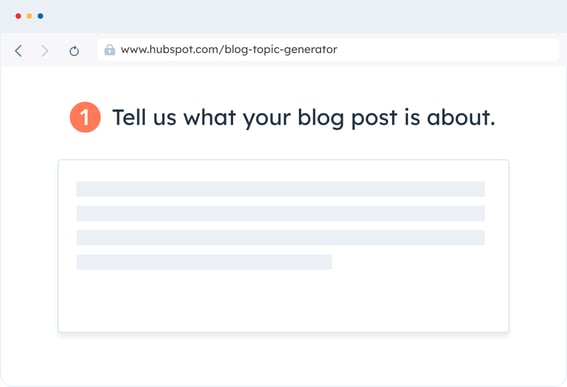
Step 1: Describe Your Desired Blog to Generate Content Ideas
Begin by describing your blog post's primary subject matter to this idea generator. Our AI Content Generator will then analyze your input to generate relevant, high-performing blog ideas and content. Include details such as your target audience, preferred content format, and business objectives to help ensure the content generated by the Blog Topic Idea Generator supports your broader marketing goals.
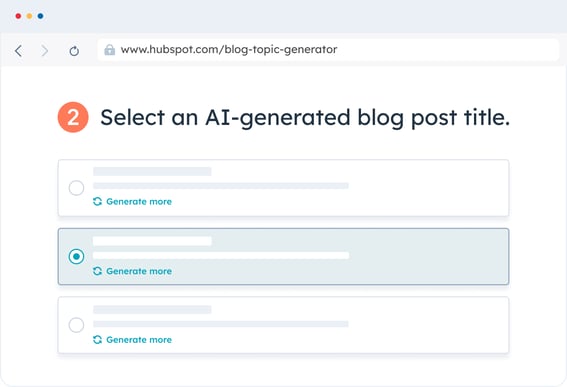
Step 2: Select Blog Titles from AI Recommendations
From your given input, HubSpot’s AI Blog Title Generator creates headlines that balance SEO requirements with compelling copy. Choose from multiple blog titles specifically optimized for search engines and user engagement. This free Blog Title Generator creates titles using proven headline formulas, optimal character lengths, and engaging elements that increase click-through rates.
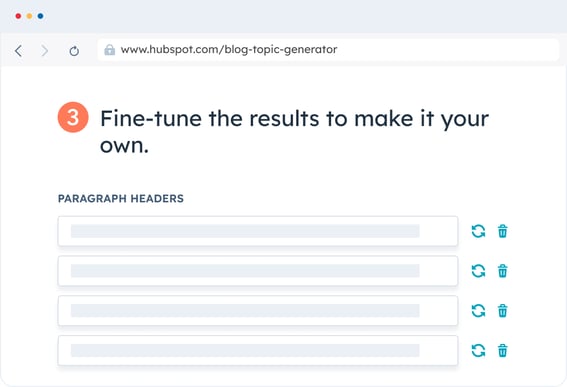
Step 3: Generate and Customize Complete Blog Content
Instantly produce a comprehensive blog draft based on your selected topic and title with this AI Blog Generator. The free blog generator creates structured, SEO-friendly blog posts that you can customize, edit, and refine to match your brand voice and specific requirements.
Once finalized, publish your content directly to HubSpot CMS or export it for use across multiple content platforms. Use this blog post creator to reduce content creation time from hours to minutes, all while maintaining professional quality and strategic focus.
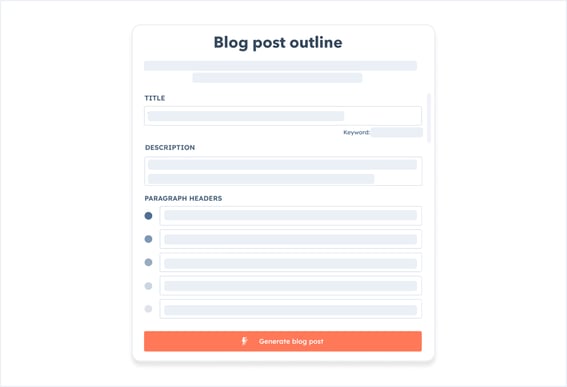
Get a comprehensive outline
Our Blog Post Content Generator helps structure your ideas into logical, reader-friendly formats that maintain engagement throughout the post. Each outline serves as a roadmap for creating thorough, well-organized content that addresses your audience's questions and interests systematically.
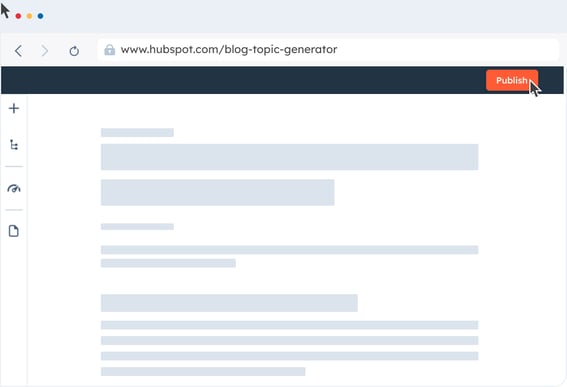
Simplify publication in HubSpot CMS
Generate your blog topic, create an outline, draft content sections, and publish your posts all within this Content Topic Generator. This unified workflow eliminates the friction of copying content between multiple tools and reduces the time from concept to publication.
Frequently Asked Questions
A blog post idea generator is an AI-powered tool that creates topic suggestions based on your input criteria, search trends, and audience interests. HubSpot's free blog post generator takes this concept one step further by not only generating topic ideas but also creating actual blog content, outlines, and headlines.
While most post idea generator tools stop at topic suggestions, HubSpot’s tool produces complete content frameworks that you can immediately use or customize for your specific needs.
Unlike other AI blog content generator tools, HubSpot’s platform is completely free to use. Get premium features at zero cost. In addition, this AI Idea Generator’s user-friendly interface requires no technical expertise or blog writing experience. Simply enter your topic area and receive professional-quality content suggestions instantly.
Prioritize topics with proven search demand while considering your content calendar, seasonal relevance, and marketing funnel alignment. Use our Blog Topics Generator to access unlimited topic ideas that showcase your content expertise and maintain consistent production.
Plan content clusters around main topics to build topical authority and improve search visibility. Enter your main topic into our Subtopic Generator and watch as our tool provides key subareas to write more posts in.
Focus on blog topics where you can provide genuine value and unique insights. HubSpot’s content suggestion tool identifies these high-value topics and creates complete content frameworks to help you get started immediately.
HubSpot’s Blog Title Generator creates multiple title variations for each topic, allowing you to test different approaches and select the most compelling option for your content. This Blog Post Title Generator ensures you will always have access to engaging, optimized headlines that capture your audience's attention and drive clicks.
Content Marketing teams: Marketing teams can use this Blog Writing Generator to create content calendars, generate topics that align with campaign objectives, and maintain consistent blog publishing schedules that support lead generation and brand awareness goals.
Small business owners: Small business owners can use this free blog topic generator to create valuable content that attracts potential customers, and maintain an active blog presence without dedicating extensive time to brainstorming.
Bloggers: Bloggers can use this free AI Idea Generator to maintain regular posting schedules, explore new content ideas and angles, and maximize their content output while minimizing research and brainstorming time.
Content creators: Content creators can leverage our AI blog subject generator to overcome creative blocks, discover topics in their niche, and produce engaging blog ideas that resonate with their audience across multiple platforms.